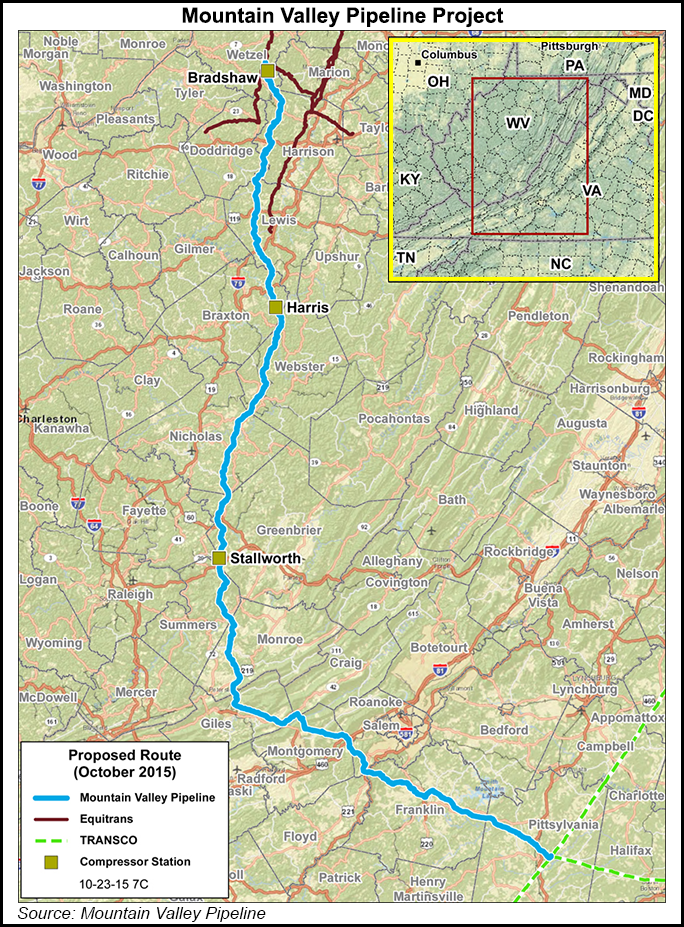Utica Shale | E&P | Infrastructure | Marcellus | NGI All News Access | NGI The Weekly Gas Market Report
FERC Issues DEIS For Mountain Valley Pipeline, Equitrans Expansion Project
FERC issued a draft environmental impact statement (DEIS) for the Mountain Valley Pipeline (MVP) and the related Equitrans Expansion Project (EEP) on Friday, adding that while the projects would result in some adverse environmental impacts, they could be adequately mitigated.

Both projects will bring natural gas from the Appalachian Basin to market. The MVP project [CP16-10] calls for construction of a 301-mile, 42-inch diameter pipeline with 2 million Dth/d of transport capacity, and includes three new compressor stations with a combined 171,600 hp. The pipeline will begin in Wetzel County, WV, and travel southeast to an interconnect with Transcontinental Gas Pipe Line Compressor Station 165 in Pittsylvania County, VA (see Daily GPI, June 30).
Meanwhile, EEP [CP16-3] would add 600,000 Dth/d of north-south capacity in Pennsylvania and West Virginia through approximately eight miles of various diameter pipelines in six segments across Greene, Allegheny and Washington counties, PA, and Wetzel County, WV. The Pratt Compressor Station also would be replaced with the new Redhook Compressor Station in Greene County. EEP would also interconnect with MVP.
Mountain Valley Pipeline LLC — a joint venture of EQT Midstream Partners LP, NextEra Energy, Con Edison Gas Midstream LLC, WGL Midstream, Vega Midstream MVP LLC and RGC Midstream LLC — filed for authorization with the Federal Energy Regulatory Commission last fall (see Daily GPI, Oct. 23, 2015). Equitrans LP did likewise for EEP (see Daily GPI, Oct. 29, 2015).
“Because the MVP and EEP are interrelated and connected actions, we are analyzing them both together in this single comprehensive EIS,” FERC said in the DEIS. The agency added that its staff “concludes that construction and operation of the projects would result in some adverse environmental impacts, but these impacts would be reduced with the implementation of the applicants’ proposed mitigation measures and the additional measures recommended in the EIS.”
Specifically, FERC called on Mountain Valley to implement measures outlined in its plans and procedures regarding erosion control; revegetation; construction through wetlands and water bodies; blasting; protecting organic farms; water testing; spill prevention; karst-specific erosion; migratory bird habitat conservation; exotic and invasive species control; fire prevention and suppression; traffic and transportation management; fugitive dust control, and winter construction. The agency also referred MVP to its mitigation plans for karst, landslides and wetlands.
Mountain Valley was also ordered to follow the U.S. Forest Service’s development guidelines for the portion of MVP that would traverse the Jefferson National Forest.
FERC called on Equitrans to adhere to its erosion and sediment control plans and procedures for the Redhook Compressor Station, and to similar rules outlined by the Pennsylvania Department of Environmental Protection. The federal agency also referred Equitrans to its measures on mine subsidence; emergency action plans; migratory bird conservation, and traffic and transportation management.
Mountain Valley and Equitrans will also both need to obtain permits from the U.S. Army Corps of Engineers, and any applicable state agencies, to conduct open-cut drilling for having the pipelines cross water bodies, FERC said.
In the interim, FERC said its staff would complete formal consultations with the U.S. Fish and Wildlife Service on whether construction of the two pipelines would impact any species listed on the Endangered Species Act. They would also complete the process of complying with the National Historic Preservation Act over potential impact to historic structures, and will “provide oversight for an environmental inspection and monitoring program that would ensure compliance with all mitigation measures that become conditions of the FERC authorizations.”
Mountain Valley hopes to begin construction later this year and have MVP entered into service by late 2018. Equitrans wants to begin construction in December.
© 2024 Natural Gas Intelligence. All rights reserved.
ISSN © 2577-9877 | ISSN © 1532-1266 | ISSN © 2158-8023 |
